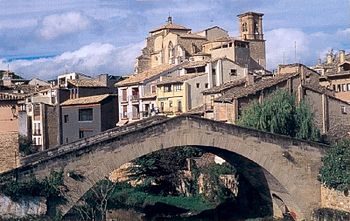Estella-Lizarra
| Estella | |||
|---|---|---|---|
| Municipality | |||

Picudo Bridge in Estella
|
|||
|
|||
| Location in Spain | |||
| Coordinates: 42°40′0″N 2°1′0″W / 42.66667°N 2.01667°W | |||
| Country |
|
||
| Autonomous Community |
|
||
| Province | Navarre | ||
| Comarca | Estella Oriental | ||
| Government | |||
| • Mayor | Koldo Leoz (EH Bildu) | ||
| Area | |||
| • Total | 15 km2 (6 sq mi) | ||
| Elevation(AMSL) | 421 m (1,381 ft) | ||
| Population (2012) | |||
| • Total | 14,138 | ||
| • Density | 940/km2 (2,400/sq mi) | ||
| Time zone | CET (UTC+1) | ||
| • Summer (DST) | CEST (GMT +2) (UTC+2) | ||
| Postal code | 31200 | ||
| Area code(s) | +34 (Spain) + 948 (Navarre) | ||
| Website | Town Hall | ||
Estella (Spanish) or Lizarra (Basque) is a town located in the autonomous community of Navarre, in northern Spain. It lies south west of Pamplona, close to the border with La Rioja and Álava.
The town was founded in 1090 when the place, lying by the fortified settlement of Lizarra, was granted a charter by the Pamplonese king Sancho Ramirez. The town became a landmark in the Way of St. James pilgrimage route to Santiago de Compostela, thriving on the privileged location and the melting pot of Francos called in by Navarrese kings (mainly Occitans from Auvergne and Limousin), Jews and the original Navarrese inhabitants. The wealth resulted in a development of Romanesque architecture, well represented in the town: Church of San Pedro de la Rúa, Palacio de los Reyes de Navarra, Church of San Miguel, among others.
The town was a major headquarters of the Carlist party in the Carlist Wars of the mid 19th century, with Tomas Zumalakarregi being appointed Commander in Chief in this Estella-Lizarra.
Between 1927 and 1967, the town held the terminus of the iconic Ferrocarril Vasco-Navarro railway extending up to Bergara. The line was fitted with electrified power supply as of 1938, a provision considered a feat at the time.
The town regularly hosts the GP Miguel Indurain.
Coordinates: 42°40′08″N 2°01′51″W / 42.66889°N 2.03083°W
...
Wikipedia



